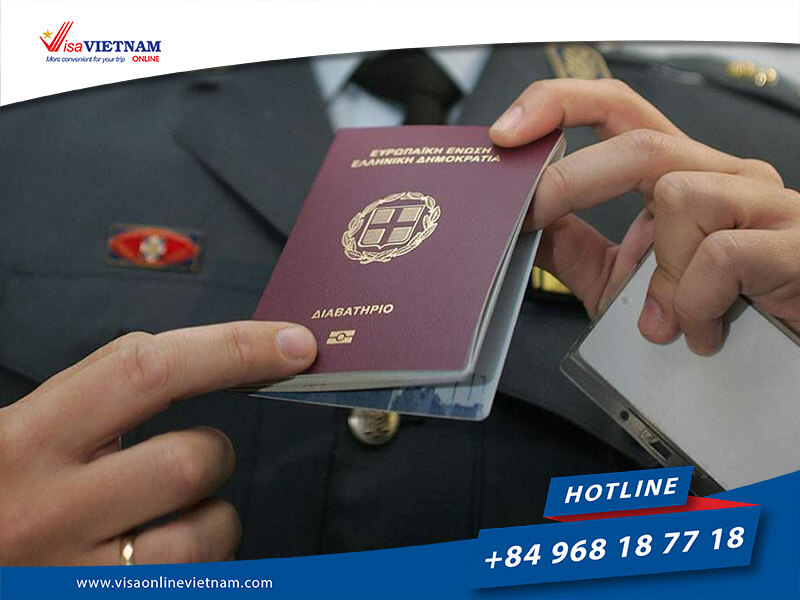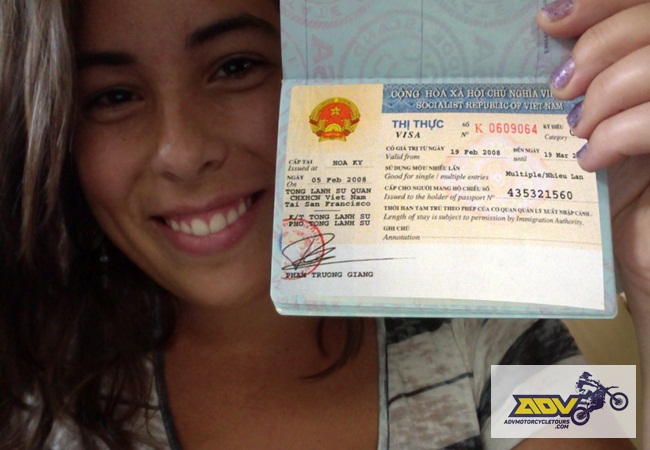Vietnam Visa for Greek Citizens Requirements, Application Process, and Tips


Obtaining a visa is an essential step for Greek citizens planning to visit Vietnam. Navigating the visa requirements and application process can sometimes be confusing, but with the right information, the process becomes much smoother. This comprehensive guide provides detailed information about Vietnam visa requirements, the application process, available visa types, fees, validity, duration of stay, visa extensions, and essential tips for Greek travelers. Read on to ensure a hassle-free journey to Vietnam.
Table of Contents
Vietnam Visa Requirements for Greek Citizens

Before applying for a Vietnam visa, Greek citizens must familiarize themselves with the requirements set by the Vietnamese government. The following are the main prerequisites for obtaining a Vietnam visa:
- Passport: Greek travelers must have a valid passport that remains valid for at least six months beyond their planned departure date from Vietnam.
- Visa Application Form: All applicants need to complete a visa application form accurately and truthfully. This form can usually be downloaded from the official website of the Vietnamese embassy or consulate.
- Photos: Two recent passport-sized photos (4cm x 6cm) are required. These photos should be taken against a white background with the applicant’s face clearly visible.
- Financial Means: Applicants may be asked to provide proof of sufficient financial means to cover their expenses during their stay in Vietnam.
- Travel Itinerary: A copy of the flight itinerary or confirmed round-trip tickets should be submitted as part of the visa application.
How to Apply for a Vietnam Visa from Greece

Greek citizens have two primary options for applying for a Vietnam visa: through the Vietnamese embassy/consulate or by opting for a visa on arrival (VOA). Here’s a detailed explanation of each method:
Applying through the Vietnamese Embassy/Consulate
To apply for a Vietnam visa through the embassy or consulate in Greece, follow these steps:
- Contact the Embassy/Consulate: Get in touch with the nearest Vietnamese embassy or consulate in Greece to inquire about specific requirements and procedures.
- Obtain the Application Form: Download the visa application form from the embassy/consulate’s official website or collect it in person.
- Complete the Application Form: Fill out the application form accurately and ensure that all necessary details are provided.
- Gather Required Documents: Prepare all the required documents, including your passport, photos, travel itinerary, and financial proof.
- Submit the Application: Submit the completed application form and supporting documents to the embassy/consulate in person or by mail, as per their instructions.
- Pay the Visa Fee: Pay the applicable visa fee at the embassy/consulate. The fee amount may vary based on the type of visa and processing time.
- Wait for Processing: The embassy/consulate will process your application, which typically takes a few business days. Keep your passport and receipt safe during this period.
- Collect Your Visa: Once your visa is ready, collect it from the embassy/consulate. Verify that all the details are correct before leaving.
Opting for Visa on Arrival (VOA)
The visa on arrival option provides convenience for Greek travelers, especially if they plan to arrive in Vietnam via air travel. Follow these steps to obtain a visa on arrival:
- Apply Online: Visit a reputable travel agency or an authorized website offering visa on arrival services. Complete the online application form, providing accurate information.
- Make Payment: Pay the visa service fee online using a secure payment platform. The fee amount varies depending on the type of visa and processing time chosen.
- Receive Approval Letter: After successful payment, you will receive an approval letter via email within the specified processing time. This approval letter acts as an official document for obtaining the visa on arrival.
- Prepare Supporting Documents: Print the approval letter and complete two copies of the Vietnamese visa application form (available for download from the website). Prepare two passport-sized photos and keep them handy for arrival.
- Arrival in Vietnam: Upon arrival at one of Vietnam’s international airports (Hanoi, Ho Chi Minh City, Da Nang, or Nha Trang), proceed to the Visa on Arrival counter before going through immigration.
- Submit Documents and Pay Stamping Fee: Present your approval letter, completed application form, passport-sized photos, and pay the stamping fee directly at the counter. The stamping fee is payable in cash (Vietnamese Dong or US dollars).
- Receive Visa Stamp: After processing, your passport will be returned with the visa stamp affixed. Verify that all the details are accurate before leaving the counter.
Types of Vietnam Visas Available for Greek Passport Holders

Greek citizens can choose from various types of visas based on the purpose and duration of their visit to Vietnam. The following are the most common visa types availablefor Greek passport holders:
- Tourist Visa (DL): This visa type is suitable for Greek travelers visiting Vietnam for tourism purposes. It allows a stay of up to 30 days and can be single or multiple entry.
- Business Visa (DN): Greek citizens traveling to Vietnam for business-related activities, such as attending meetings or conferences, should apply for a Business Visa. It also allows a maximum stay of 30 days and can be single or multiple entry.
- Work Visa (LD): If Greek nationals are planning to work in Vietnam, they need to obtain a Work Visa. This visa requires sponsorship from a Vietnamese employer and allows a longer stay duration based on the employment contract.
- Student Visa (DH): Greek students enrolled in educational institutions in Vietnam should apply for a Student Visa. The duration of stay depends on the study program enrolled in and requires sponsorship from the respective educational institution.
- Investor Visa (DT): Greek investors planning to invest in Vietnam can apply for an Investor Visa. This visa type allows a longer stay and requires proof of investment in Vietnam.
- Transit Visa (TT): If Greek travelers have a layover in Vietnam and continue their journey to another country within 72 hours, they may be eligible for a Transit Visa, allowing them to stay in the designated transit area of the airport.
It’s important to carefully select the appropriate visa type that matches the purpose and duration of your visit to ensure a smooth entry into Vietnam.
Vietnam Visa Application Process for Greeks
The application process for a Vietnam visa may vary depending on the chosen method of application. Here’s a step-by-step guide to help Greek citizens navigate through the application process:
Applying through the Vietnamese Embassy/Consulate
- Contact the nearest Vietnamese embassy or consulate in Greece to inquire about specific requirements and procedures.
- Obtain the visa application form from the embassy/consulate’s official website or collect it in person.
- Fill out the application form accurately, providing all necessary details.
- Prepare the required documents, including a valid passport, photos, travel itinerary, and financial proof.
- Submit the completed application form and supporting documents to the embassy/consulate as per their instructions.
- Pay the applicable visa fee at the embassy/consulate.
- Wait for the processing of your application, which typically takes a few business days.
- Collect your visa from the embassy/consulate, ensuring all details are correct before leaving.
Opting for Visa on Arrival (VOA)
- Visit a reputable travel agency or authorized website offering visa on arrival services.
- Complete the online application form with accurate information.
- Pay the visa service fee securely through the online payment platform.
- Receive the approval letter via email within the specified processing time.
- Print the approval letter and complete two copies of the Vietnamese visa application form.
- Prepare two passport-sized photos and keep them handy for arrival.
- Upon arrival at one of Vietnam’s international airports, proceed to the Visa on Arrival counter.
- Submit the required documents, pay the stamping fee, and receive the visa stamp in your passport.
Remember to carefully follow all instructions provided by the embassy/consulate or the visa on arrival service provider to ensure a successful visa application.
Documents Needed for Vietnam Visa Application from Greece
When applying for a Vietnam visa, Greek citizens need to prepare several essential documents to support their application. The following documents are generally required:
- Passport: A valid passport with a minimum validity of six months beyond the planned departure date from Vietnam.
- Visa Application Form: Completed accurately and truthfully, following the guidelines provided by the embassy/consulate or visa on arrival service provider.
- Photos: Two recent passport-sized photos (4cm x 6cm) with a white background, clearly showing the applicant’s face.
- Flight Itinerary: A copy of the flight itinerary or confirmed round-trip tickets showing entry and exit dates from Vietnam.
- Financial Proof: Documents demonstrating sufficient financial means to cover expenses during the stay in Vietnam, such as bank statements or credit card statements.
- Additional Supporting Documents: Depending on the visa type and purpose of visit, additional documents may be required, such as invitation letters, employment contracts, or educational enrollment letters.
It is advisable to check the specific requirements with the Vietnamese embassy/consulate or visa service provider to ensure all necessary documents are prepared for a smooth visa application process.
Vietnam Visa Fees for Greek Nationals
The visa fees for Greek citizens applying for a Vietnam visa may vary based on different factors, including visa type, processing time, and method of application. Here are some key points to consider regarding visa fees:
- Embassy/Consulate Visa Fees: When applying through the Vietnamese embassy/consulate in Greece, the visa fee must be paiddirectly to the embassy/consulate. The fee amount will depend on the type of visa and the processing time chosen. It is advisable to contact the embassy/consulate or check their official website for the current fee structure.
- Visa on Arrival Fees: For visa on arrival, Greek travelers need to pay two separate fees: the visa service fee and the stamping fee.
- Visa Service Fee: This fee is paid online to the authorized visa on arrival service provider. The fee amount varies depending on the type of visa and processing time selected. It covers the processing of your visa application and the issuance of the approval letter.
- Stamping Fee: Upon arrival at one of Vietnam’s international airports, the stamping fee must be paid in cash (Vietnamese Dong or US dollars) at the Visa on Arrival counter. The stamping fee amount also depends on the type of visa. It is recommended to have the correct amount ready to expedite the process.
It is important to note that visa fees are subject to change, so it is advisable to verify the latest fee information before submitting the application or proceeding with the visa on arrival process.
Vietnam Visa on Arrival vs. Embassy Visa for Greeks
Greek citizens have the option to choose between applying for a visa on arrival or obtaining a visa through the Vietnamese embassy/consulate in Greece. Here’s a comparison to help decide between these two methods:
Visa on Arrival:
- Convenient for air travelers: Visa on arrival is suitable for those arriving in Vietnam by air, as it allows them to obtain a visa upon arrival at the airport.
- Simple application process: The online application for visa on arrival can be completed quickly, and the approval letter is usually issued within a few business days.
- No need to send original documents: With visa on arrival, there’s no requirement to send original documents, reducing the risk of document loss.
- Limited to air travel: Visa on arrival is not available for travelers entering Vietnam by land or sea.
Embassy Visa:
- Suitable for all modes of entry: Embassy visa can be obtained regardless of whether the traveler enters Vietnam by air, land, or sea.
- More flexibility in visa types: The embassy/consulate can provide a wider range of visa types to cater to specific travel purposes.
- Longer processing time: Embassy visa applications may take longer to process, as they involve submitting documents and waiting for approval before traveling.
- Original document submission: Some embassy/consulates require applicants to submit original documents, which can be inconvenient and carry a risk of loss.
Considering the mode of entry, convenience, and specific travel needs will help Greek citizens choose the most suitable method for obtaining their Vietnam visa.
Validity and Duration of Stay for Vietnam Visa for Greeks
The validity and duration of stay for a Vietnam visa issued to Greek citizens depend on the type of visa granted. Here’s an overview:
- Tourist Visa: A tourist visa allows a maximum stay of 30 days in Vietnam. It can be either single or multiple entry, with the latter allowing multiple entries within the visa validity period.
- Business Visa: Similar to the tourist visa, a business visa also allows a maximum stay of 30 days. It can be single or multiple entry, depending on the applicant’s needs.
- Work Visa: Work visas have longer validity and duration of stay. The length of stay depends on the employment contract and the approval of the Vietnamese authorities. Typically, work visas are valid for one year and can be extended.
- Student Visa: The validity and duration of stay for a student visa depend on the enrolled study program. The visa is typically valid for the duration of the program and can be extended if necessary.
- Investor Visa: Investor visas are generally valid for one year or more, allowing Greek investors to stay in Vietnam for an extended period. The specific duration will be determined based on the investment project.
It is crucial to adhere to the permitted duration of stay mentioned on the visa to avoid any immigration-related issues during your time in Vietnam.
Vietnam Visa Extension for Greek Travelers
If Greek citizens wish to extend their stay in Vietnam beyond the initially granted period, they have the option to apply for a visa extension. Here’s what you need to know about the visa extension process:
- Eligibility: Visa extensions are typically available for tourist visas, business visas, and work visas. However, the extension must comply with the regulations set by the Vietnamese immigration authorities.
- Application Process: To apply for a visa extension, visit the Immigration Department or the authorized agency responsible for handling visa extensions. Submit the required documents, including the original passport, application form, and visa extension fee.
- Required Documents: The specific documents required may vary depending on the type of visa and the reason for the extension. Generally, you will need a completed application form, theoriginal passport, a recent passport-sized photo, and the visa extension fee. Additional documents may be required based on your specific circumstances, such as a letter explaining the reason for the extension or supporting documents related to your stay in Vietnam.
- Processing Time and Fee: The processing time for visa extensions can vary, but it is advisable to apply well in advance of your current visa’s expiration date. The fee for the visa extension will depend on the duration of the extension requested.
- Approval and Sticker Placement: If your visa extension application is approved, you will receive a new visa sticker affixed to your passport indicating the extended duration of stay. It’s important to check the accuracy of the information on the new visa sticker before leaving the immigration office.
Remember that visa extensions are subject to approval by the Vietnamese immigration authorities, and it is essential to comply with all relevant regulations and requirements during your stay in Vietnam.
Essential Tips for Greek Travelers to Vietnam
Here are some essential tips for Greek citizens traveling to Vietnam:
- Plan in Advance: Start the visa application process well in advance to allow sufficient time for processing and avoid any last-minute complications.
- Choose the Right Visa Type: Select the appropriate visa type based on the purpose and duration of your visit to Vietnam to ensure compliance with immigration regulations.
- Check Entry Requirements: Stay updated on the latest entry requirements and travel advisories issued by the Vietnamese government or your embassy to ensure a smooth entry into Vietnam.
- Ensure Passport Validity: Check that your passport remains valid for at least six months beyond your planned departure date from Vietnam.
- Follow Visa Regulations: Adhere to the rules and regulations specified on your visa, including the permitted duration of stay and any conditions or restrictions mentioned.
- Respect Local Customs: Familiarize yourself with the local customs, traditions, and laws of Vietnam to ensure a respectful and enjoyable experience during your visit.
- Travel Insurance: Consider obtaining comprehensive travel insurance that covers medical emergencies, trip cancellations, and other unforeseen circumstances for added peace of mind.
- Currency and Payments: Familiarize yourself with the local currency (Vietnamese Dong) and ensure you have enough cash or access to ATMs for your expenses. Credit cards are widely accepted in major establishments, but it’s advisable to carry some cash for smaller vendors or remote areas.
- Health and Safety: Prioritize your health and safety by following hygiene practices, drinking bottled water, and taking necessary precautions against common illnesses. It’s also recommended to check for any required vaccinations before traveling to Vietnam.
- Explore Beyond the Tourist Areas: While popular attractions are worth visiting, consider exploring lesser-known places and interacting with locals to experience the authentic Vietnamese culture.
By following these tips and being well-prepared, Greek travelers can have a memorable and hassle-free visit to Vietnam.